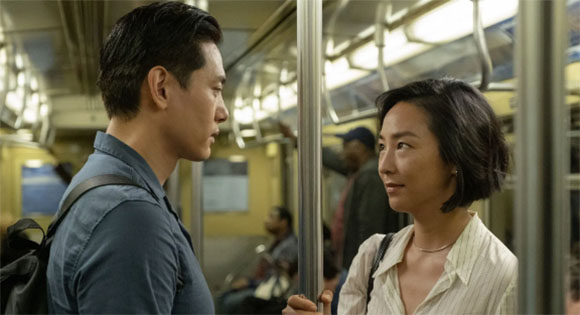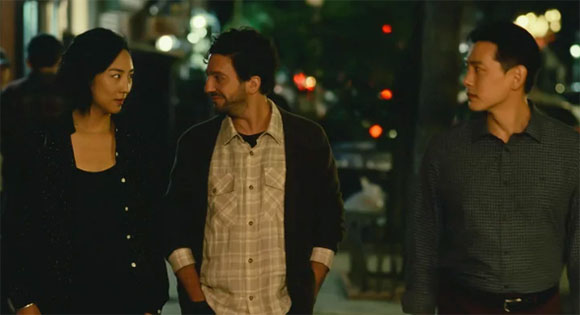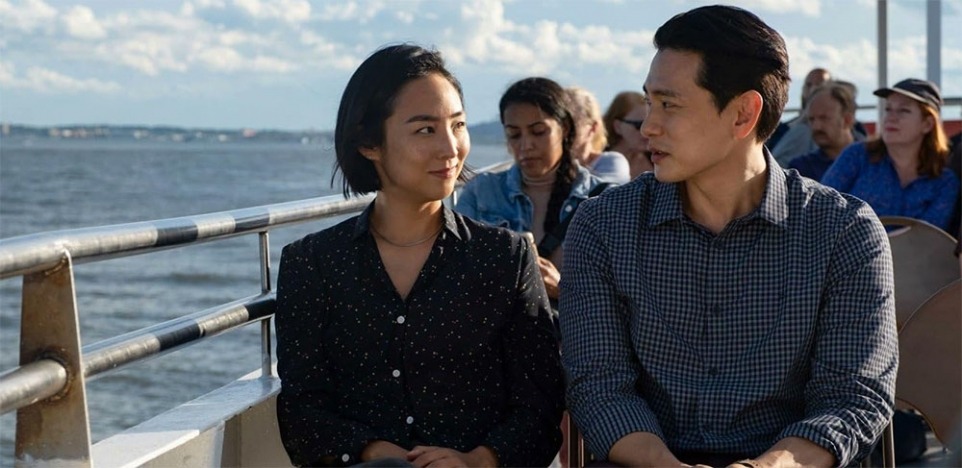Celine Song directed and wrote the broadly autobiographical Past Lives, a gorgeously filmed meditation on love, friendship, memory, and who we are to the people we meet in our past, present, and future lives.
Na Young (Greta Lee) and Hae Sung (Teo Yoo) were childhood friends in Korea before her family immigrated to Canada. This separation sets their lives on different trajectories: Na Young becomes Nora, a playwright in New York City; she eventually marries Arthur (John Magaro), also a writer, and they live a somewhat Bohemian life in the East Village.
Meanwhile, Hae Sung fulfills his military service, studies engineering and Mandarin, and maintains what Nora names a “really Korean” life.
Nora and Hae Sung meet after their lives have taken shape, and she reflects to Arthur, “I feel so not Korean when I am with him… but also, in some way, more Korean? It’s so weird.”

Although the story covers 24 years, the heart of the movie beats for two days in New York City. With decades of friendship, marriage, longing, and defining choices pushing them together and pulling them apart, Nora, Hae Sung, and Arthur finally share the same geographic space and take up the question asked in the first scene of the film: “Who are they to one another?”
And from there, with the “love triangle” fully present, the movie employs not a single relationship cliche or trope. Rather, director Song sits with these characters, so lovingly and subtly drawn, as they bring their whole and best selves – not their reactive selves and egos – to the question.
And we sit with them, too, because each meditation on that question is a bit of nourishment for our spiritual lives; we can’t take in their beauty and wisdom without swallowing some pain.
In one scene, sitting at a bar like three birds on a wire, they carry on a stilted, sideways conversation in Korean and English, but eventually, Nora and Hae Sung turn to each other, speaking fluidly in Korean while Arthur sips his drink and keeps his body square with the camera frame.
“The truth I learned here is you had to leave because you’re you,” Hae says to Nora. “And the reason I liked you was because you’re you. And who you are is someone who leaves.”
Nora responds to Hae’s tragic irony with her own reflection, questioning the unity of identity: “The Na Young you remember doesn’t exist here. … She’s not sitting here in front of you, but that doesn’t mean she’s not real. Twenty years ago, I left her behind with you.”
As they are settling up, Arthur shares a moment alone with Hae and says tenderly, if inscrutably, “I’m really glad you came here. It was the right thing to do.”

Past Lives asks the audience to feel each complication in these moments of truth. Or perhaps better, it asks us to stand, open our hands, and — with the kind of attention that can only come from love — to juggle them. As we stand up for our lives, we have to hold it all: missed opportunities and opportunities taken, what we’ve built and what we’ve lost, those who leave and those who stay; all of it makes up the positive and negative space that shapes what we call our life.
This pleasure-pain blend definitely has kick, but it slides down nonetheless because the performances of Yoo, Lee and Magaro are utterly disarming. Magnetized to one another, they magnetize the viewer, making it impossible to stop caring for or feeling with them.
The blend also goes down easier because of the film’s consoling philosophy: the Buddhist concept of in-yun. There is no equivalent concept in the English lexicon, though Nora suggests “Providence.” More precisely, in-yun is about relationships between people and posits a world with no accidental meetings. All meetings, from brushing up against someone in a crowd to marrying someone, result from relationships in past lives.
In-yun offers a double consolation to life’s exhilarating and disappointing juggling act: First, it offers the consolation of meaning and connection: things may not turn out as we envisioned, and we may not understand why, but if we hold onto in-yun, we know a story is being told, and that we are playing our part in a cast of interesting characters.
And second, it offers the possibility that one life’s missed chance is another life’s consummation; one life’s casual encounter is another life’s love affair.
The question lingers: “What if this is a past life as well, and we are already something else to each other in our next life?”
